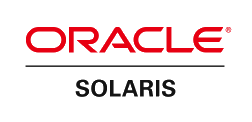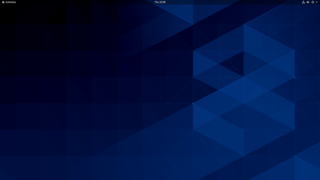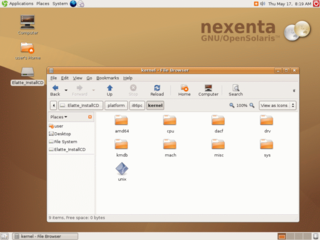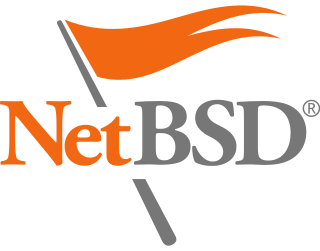
A Linux distribution is an operating system made from a software collection that is based upon the Linux kernel and, often, a package management system. Linux users usually obtain their operating system by downloading one of the Linux distributions, which are available for a wide variety of systems ranging from embedded devices and personal computers to powerful supercomputers.

Solaris is a proprietary Unix operating system originally developed by Sun Microsystems. It superseded the company's earlier SunOS in 1993. In 2010, after the Sun acquisition by Oracle, it was renamed Oracle Solaris.
pSOS is a real time operating system (RTOS), created in about 1982 by Alfred Chao, and developed/marketed for the first part of its life by his company Software Components Group (SCG). In the 1980s pSOS rapidly became the RTOS of choice for all embedded systems based on the Motorola 68000 family architecture, because it was written in 68000 assembler and was highly optimised from the start. It was also modularised, with early support for OS-aware debugging, plug-in device drivers, TCP/IP stacks, language libraries and disk subsystems. Later came source-level debugging, multi-processor support and further networking extensions.
MontaVista Software is a company that develops embedded Linux system software, development tools, and related software. Its products are made for other corporations developing embedded systems such as automotive electronics, communications equipment, mobile phones, and other electronic devices and infrastructure.

CentOS is a Linux distribution that provides a free, community-supported computing platform functionally compatible with its upstream source, Red Hat Enterprise Linux (RHEL). In January 2014, CentOS announced the official joining with Red Hat while staying independent from RHEL, under a new CentOS governing board.
Technical variations of Linux distributions include support for different hardware devices and systems or software package configurations. Organisational differences may be motivated by historical reasons. Other criteria include security, including how quickly security upgrades are available; ease of package management; and number of packages available.
OpenEmbedded is a build automation framework and cross-compile environment used to create Linux distributions for embedded devices. The OpenEmbedded framework is developed by the OpenEmbedded community, which was formally established in 2003. OpenEmbedded is the recommended build system of the Yocto Project, which is a Linux Foundation workgroup that assists commercial companies in the development of Linux-based systems for embedded products.

LAMP is a very common example of a web service stack, named as an acronym of the names of its original four open-source components: the Linux operating system, the Apache HTTP Server, the MySQL relational database management system (RDBMS), and the PHP programming language. The LAMP components are largely interchangeable and not limited to the original selection. As a solution stack, LAMP is suitable for building dynamic web sites and web applications..

Nexenta OS, officially known as the Nexenta Core Platform, is a discontinued computer operating system based on OpenSolaris and Ubuntu that runs on IA-32- and x86-64-based systems. It emerged in fall 2005, after Sun Microsystems started the OpenSolaris project in June of that year. Nexenta Systems, Inc. initiated the project and sponsored its development. Nexenta OS version 1.0 was released in February 2008.

Linux is a family of open source Unix-like operating systems based on the Linux kernel, an operating system kernel first released on September 17, 1991, by Linus Torvalds. Linux is typically packaged in a Linux distribution.
GNU variants are operating systems based upon the GNU operating system. According to the GNU project and others, these also include most operating systems using the Linux kernel and a few others using BSD-based kernels.
The Ångström distribution is a Linux distribution for a variety of embedded devices. The distribution is the result of work by developers from the OpenZaurus, OpenEmbedded, and OpenSIMpad projects. The graphical user interfaces (GUIs) available are OPIE and GPE among other options.

ELinOS is a commercial development environment for embedded Linux. It consists of a Linux distribution for the target embedded system and development tools for a development host computer. The development host computer usually is a standard desktop computer running Linux or Windows. The Linux system and the application software for the target device are both created on the development host.

RPM Package Manager (RPM) is a free and open-source package management system. The name RPM refers to .rpm file format and the package manager program itself. RPM was intended primarily for Linux distributions; the file format is the baseline package format of the Linux Standard Base.
wolfSSL is a small, portable, embedded SSL/TLS library targeted for use by embedded systems developers. It is an open source implementation of TLS written in the C programming language. It includes SSL/TLS client libraries and an SSL/TLS server implementation as well as support for multiple APIs, including those defined by SSL and TLS. wolfSSL also includes an OpenSSL compatibility interface with the most commonly used OpenSSL functions.

NetBSD is a free and open-source Unix-like operating system based on the Berkeley Software Distribution (BSD). It was the first open-source BSD descendant officially released after 386BSD was forked. It continues to be actively developed and is available for many platforms, including servers, desktops, handheld devices, and embedded systems.
OpenWrt is an open source project for embedded operating systems based on Linux, primarily used on embedded devices to route network traffic. The main components are Linux, util-linux, musl, and BusyBox. All components have been optimized to be small enough to fit into the limited storage and memory available in home routers.

Flatpak is a utility for software deployment and package management for Linux. It is advertised as offering a sandbox environment in which users can run application software in isolation from the rest of the system.









